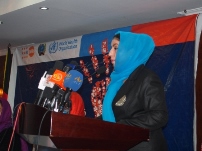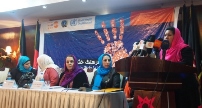 Deputy Minister of Public Health Dr Najia Tariq emphasized that the health sector must provide survivor-centered care to women and girls experiencing violenceKabul 30 November 2014 – Today the Ministry of Public Health, together with the United Nations Population Fund (UNFPA) and the World Health Organization (WHO), celebrated the International Day for the Elimination of Violence against Women. At an event held in Kabul, women’s rights activists, United Nations (UN) agencies and health professionals called for stronger efforts to combat gender-based violence (GBV) and strengthen health sector response to GBV.
Deputy Minister of Public Health Dr Najia Tariq emphasized that the health sector must provide survivor-centered care to women and girls experiencing violenceKabul 30 November 2014 – Today the Ministry of Public Health, together with the United Nations Population Fund (UNFPA) and the World Health Organization (WHO), celebrated the International Day for the Elimination of Violence against Women. At an event held in Kabul, women’s rights activists, United Nations (UN) agencies and health professionals called for stronger efforts to combat gender-based violence (GBV) and strengthen health sector response to GBV.
Violence against women is a major public health problem and a violation of women's human rights: it can result in physical, mental, sexual and reproductive health problems, and even death. To tackle this issue, the Ministry of Public Health, in close collaboration with the UN, is implementing a multisectoral response through the establishment of family protection centres, the introduction of a GBV treatment protocol nationwide, and the implementation of a GBV data collection system.
“Health facilities need to provide supportive and survivor-centered care to women and girls experiencing violence and the family protection centers are an excellent example of this,” said Deputy Minister of Public Health Dr Najia Tariq. “Also, the recently launched GBV treatment protocol shows the Government’s commitment to combating all forms of violence against women and building the capacity of the health sector to effectively respond to such violence.”
Health systems have an important role to play in GBV response by contributing to the prevention of the recurrence of violence and mitigating the consequences of violence. Identifying and documenting incidents of violence is crucial, as well as ensuring the provision of clinical care and appropriate referrals to survivors. Health systems must also play a role in advocating for interventions to combat the social acceptability and tolerance of violence against women.
“Violence against women is a global pandemic that requires stronger efforts from all sectors. Health facilities are often the first entry points where women and girls experiencing violence seek help. It is therefore essential that the health system has the necessary capacity to respond to GBV cases in a safe and effective manner,” says UNFPA Representative Dr Annette Sachs Robertson. “Currently six provinces have specific family protection centers where gender-based violence survivors can seek for counselling, medical treatment and legal information, among other services. With the support of UNFPA, the Ministry of Public Health will expand the health sector response to GBV to 12 new provinces by 2017, establishing new family protection centres.”
Nationwide data on violence against women is scarce, but research suggests that more than 80 per cent of women in Afghanistan experience at least one form of domestic violence. According to global estimates, one in three women experience either physical and/or sexual violence at least once in their lives. Recent global figures indicate that as many as 38 per cent of murders of women are committed by their husbands or partners.
“There is no magic solution for strengthening health sector response to violence against women: political will, effective capacity-building, health systems strengthening, institutional changes and strong multisectoral coordination and collaboration are needed,” says Dr Rik Peeperkorn, WHO Country Representative. “The GBV treatment protocol is major step forward in addressing GBV from a health care perspective. WHO will support the Ministry of Public Health in implementing the protocol by training over 6000 health care providers and strengthening health systems for GBV care in all 34 provinces over the next five years. The fact that violence against women is a serious public health issue has been ignored for too long.”
 Samira Hamidi from the Afghan Women's Network called for stronger cooperation between different sectors in the fight against GBVSamira Hamidi from the Afghan Women’s Network emphasized the importance of ensuring that the media handle GBV issues in a responsible and ethical manner, guaranteeing survivors’ privacy and safety. Calling for the inclusion of civil society in all aspects of GBV work and coordination, Ms Hamidi underlined that multisectoral cooperation is absolutely crucial for achieving effective results in the fight against violence against women.
Samira Hamidi from the Afghan Women's Network called for stronger cooperation between different sectors in the fight against GBVSamira Hamidi from the Afghan Women’s Network emphasized the importance of ensuring that the media handle GBV issues in a responsible and ethical manner, guaranteeing survivors’ privacy and safety. Calling for the inclusion of civil society in all aspects of GBV work and coordination, Ms Hamidi underlined that multisectoral cooperation is absolutely crucial for achieving effective results in the fight against violence against women.
“Many people question whether progress has been achieved by civil society and other actors who have been working on violence against women issues over the last 13 years in Afghanistan. Of course many problems remain, but the fact that we are even here today at this event, talking about violence against women as a serious issue to be tackled – that itself is already progress,” said Ms Hamidi.



